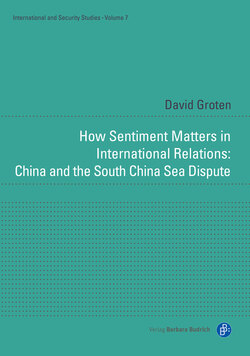Читать книгу How Sentiment Matters in International Relations: China and the South China Sea Dispute - David Groten - Страница 31
На сайте Литреса книга снята с продажи.
[57] 2.3.7 Reliance on Minor Issues
ОглавлениеIn addition, a close look at China’s perception of decision-making processes and international negotiations is another approach to gauge the role of (dis)respect. Negative emotions resulting from disrespect experiences may incline actors to propose (or in the case of states: pursue) fast and hasty measures, largely ignoring possible costs and other negative (material) consequences implied (Rosen, 2005). For instance, policy recommendations (cf. Hypothesis III) suggesting fierce policy measures even though a more cooperative approach would be less costly and would bring about fewer disadvantages may point to the relevance of respect. Likewise, cases in which Chinese policy actors are “forcefully expressing their national position, even though they are presuming that this may cause undesired diplomatic responses” (Wolf, 2008, p. 20) may also indicate that respect concerns are at stake. The same logic applies to circumstances under which Chinese policymakers made their position abundantly clear and were adamant about the latter, even though the issue at stake was a rather marginal one to which a more cautious (or no) response would incur less diplomatic, symbolic and political costs85 (cf. Schröder, 1994). Such circumstances, for instance, may be illustrated by international negotiations (on certain rights) that are actively being interrupted or suspended by China even though a continuation would appear to be much more to China’s advantage than struggling for such minor rights as a matter of principle.
Ultimately, if these six indicators described, or at least the majority of them, can be traced in FPTT discourses on the SCS in question, Hypothesis II, pertaining to the presence of respect dynamics and disrespect experiences, is considered to be confirmed.
